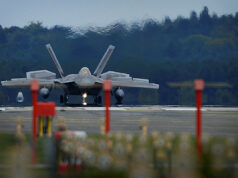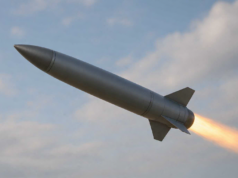Unite, the UK’s largest defence and manufacturing union, has welcomed Türkiye’s agreement to purchase 20 Typhoon fighter jets but warned that the Royal Air Force must place its own new orders to sustain British jobs and engineering capability.
The £8 billion deal, announced during Prime Minister Keir Starmer’s visit to Ankara, was described by the union as “very welcome news” for thousands of members employed by BAE Systems, Rolls-Royce, Leonardo and other companies in the Typhoon supply chain. Unite said the contract will help maintain production lines and preserve critical fast jet assembly expertise in the UK.
Unite general secretary Sharon Graham said, “This new Typhoon order is very welcome news for our members. Unite has been extremely clear about the need for having more British-built Typhoons in order to sustain jobs and vital engineering skills in the UK, especially in final assembly capability.”
However, Graham added that the UK government must now match its export success with domestic investment. “Now our own government needs to follow suit and buy new state-of-the-art British Typhoons to replace the RAF’s ageing fast-jets. The prime minister promised to use the defence budget to get workers in Britain building, so what are we waiting for?”
The RAF currently operates around 137 Typhoon aircraft, with the oldest airframes entering service two decades ago.
Defence analysts have previously suggested that a new batch of upgraded Typhoons could help bridge the gap before the introduction of the UK’s next-generation combat aircraft, the Global Combat Air Programme (GCAP), expected in the late 2030s.














Is that 137 including Trenche 1? If so, it’s going to be 107 and less.
Indeed.
Problem is RAF has lost interest in Typhoon and F35B and is now going all in on manoeuvres for F35A.
Which F35 flavour is irrelevant as the weapons fit us so poor with UK sovereign weapons.
However, Typhoon is mature in this respect and BAE can control integration.
Says the same woman who has called BAe workers out on strike!
Same old really, the Unions trying to protect jobs..
No chance, the RAF want to move on from Gen 4.5, they have no intention of buying more.
As undoubtedly capable as Thypoon is, particularly with all the latest magic source, it will be at a disadvantage against advanced Chinese supplied aircraft in the 2030’s.
If money wasn’t an issue, I would be all for additional tranche 4 Thypoon, plus the comprehensive upgrade of tranche 2 and 3 to the same standard.
But, sadly money is a problem, so reluctantly I agree with the RAF and purchase more F35A while we wait fir Tempest to come down the line.
Lack of Typhoon demand threatens the baseline skills required for GCAP Tempest so these preferences are ignorant of their consequences. Specifically increasing cost and risk for Tempest, while reducing UK defence credibility. Not a problem if scrapping GCAP to buy F-47 is your plan, but otherwise a mistake..
I don’t really think it does, the Turkish order keeps the old Thypoon jigs operating until 2030.
Consider GCAP service entry by 2035, that means a new production line with barrels of GCAP magic source for 3d printing, machines that go ping etc etc up and running by 2031 (at least).
So a brand new line and brand new manufacturing technology, one would assume in the same building the Thypoon jigs currently occupy.
The RAF’s “shiny new toy” obsession needs to be brought to heel sharpish. F35 has no UK sovereign standoff weapons and reputedly very poor availability.
A production gap at Warton could undermine the entire GCAP program. Allowing a production gap at Barrow cost the RN billions in delays and defects on Astute, this can simply not be allowed to happen in fast combat air
The RAF now operates 111 Typhoons (4 tranche 1’s in The Falkland’s until 2027).
It’s not just an industrial and skills argument, it’s needed for the RAF to retain mass and not stretch the existing Typhoon fleet too much.
France is warning something like 280 Rafale’s! We need 200 fast-jets at the very least (70 F35’s and 130 Typhoon’s).
How many of those 280 jets are deployable is a valid question!
We need the 72 F35B to get that program to critical mass.
The argument that I can see is that by the time Typhoon is upgraded F35 will be on Blk4 and also all singing and dancing – problem is that LM aren’t hitting timelines.
With LM already years late, and reliability of the administration very much in doubt, European independent capability is even more valuable than before. More Typhoons are not only necessary but also sends the right message to those assuming that UK taxpayers will cover the slow delivery for all of the JSF Programme, and accept poor integration work.
Sadly Thypoon is now in the process of becoming obsolescent in regards its superiority to the latest Chinese designs and technology.
Would you want to be potentially sending young RAF pilots against Chinese export Gen5/6 aircraft in the early 2030’s?
I wouldn’t. Thypoon is still a tremendous fighter, but its had its heyday, its still extremely capable, but in the next 5 years it will be on the back foot.
China is bringing 5th gen fighters into service, but is it exporting them yet?
Typhoon is fully matured with upgraded weapons / sensors will still be more than capable against the vast majority of adversaries for many years to come.
The key factor here is the incredible speed of advancement with Chinese weapon systems.
They have the money to just crack on.
The Americans arn’t laughing anymore and they are very much sitting up and paying close attention.
I think the Typhoon would more than hold its own against Chinas over hyped jets. Whos stats have long been in Question.
Agreed however Chinese jets in the Pakistan Air force did rather well against the French Rafales in the India Air force a couple of months ago . Like the saying never underestimate your Enemy .
Absolutely, if fighting yesterday’s wars is what you’re looking to do.
Try looking at the current speed of Chinese development and ask yourself where they will be in 2035.
I respectfully call BS on this. Typhoon batch 4 with ECRS 2 and and evolved Meteor will be a formidable package.
The harsh reality is noone is getting F35 block 4 until the 2030s, and we’re not at the front of the queue in any case
We will see I guess, all will become readily apparent if Tranche 2 arn’t upgraded.
It means the RAF will want them gone, probably by 2035.
A simple Google search will show that China’s 5th generation aircraft have been hindered by struggles in developing and producing the WS-15 engine intended for the aircraft. They have had to first rely on less capable Russian engines, and then an inferior domestically produced engine.
The Typhoon is more than a capable match for any Chinese “5th Generation” aircraft, and the RAF pilots are definitely more superior, having benefitted from years of real action in combat.
Actually, there is nothing in any nation’s inventory that could match what the UK could provide, except numbers. As such, another 50 Typhoon airframes are not just desirable, but also necessary to provide the nation with the proper capability to defend itself. Further development of the aircraft and it’s weapons systems would also enable it to keep pace with anything potential threats could come up with.
In an ideal world, yes. But the RAF has been very public about not procuring any more.
Money allowing, I absolutely agree, upgrade the entire fleet and procure a top up batches.
The RAF really do want F35A however, they will more than likely build on the 12 aircraft base order ‘if’ they can fund it.
As said, if Tranche 2 isn’t upgraded, then its got 10 years at best in the RAF.
F35 is still inferior on Serviceability and Cost per hour to fly. SAAB have identified their Grippen advantage in both of these factors too.
RAF has relevant experience because excellence is enabled and required by training and exercises. So having an aircraft that allows a lot of purposeful flying hours is a significant combat effectiveness advantage.
One that F35 is nowhere near with no short term prospect to match. The F35A specifically brings the B61 tactical nuclear deterrent that prevents RF using their tactical nuclear weapons. However the USAF units on UK bases already bring F35A, along with the existing Nuclear Sharing Agreement members in Europe (6). So that’s UK catching up, not bringing something new.
I see no prospect of facing CCP aircraft given the NATO European focus and UK responsibilities.
SCS is a USN lead with USAF support.
Well Starmer is grandstanding saying the 20 for Turkey is good for Defence.
How? When HMG are paralysed to order any new equipment?
This government are also taking all the credit, even though the diplomacy behind this has been ongoing for years.
So you’re talking out of your behinds, aren’t you.
Airbus is going to pitch the Eurofighter to Portugal to replace its F-16s, apparently.
If sold to Portugal those Typhoons won’t be coming of the British final assembly line.
Cost conscious Portugal would be better off buying Gripen E.
Highly capable, meets all there needs and far cheaper to own and operate than anything else.
Perhaps off the Brazilian line as the countries maintain close links.
Grippen E is not a sovereign aircraft being subject to ITAR captivity with the GE jet engine and some components.
If SAAB went for Grippen G with EuroJet EJ230 engine and alternative components to avoid ITAR captivity they would have a winner for Portugal, Canada and Ukraine just for starters.
A straight fight between Typhoon tr4 and Grippen G would allow Portugal to decide if EW or Cost per hour are more important to them..
https://ukdefencejournal.org.uk/uk-confirms-2-35-billion-budget-for-typhoon-radar-project/